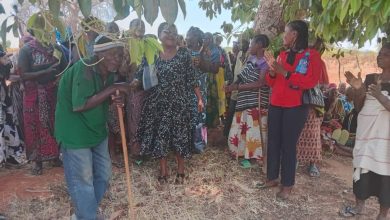ESG: From boardrooms to communities in Tanzania

MOROGORO: IN today’s interconnected world, the term ESG (Environmental, Social and Governance) has emerged as a central pillar of how societies and economies chart their paths toward sustainable development.
No longer confined to the lexicon of investors and corporate boardrooms, ESG represents a holistic framework that connects environmental protection, social responsibility and transparent governance into a single compass pointing toward a sustainable future.
Globally, ESG standards have become the yardstick by which nations, corporations and institutions measure progress toward resilience and ethical growth.
In Tanzania, this movement is gaining momentum as diverse stakeholders from bankers to conservationists to journalists begin to weave ESG principles into their professional practices and national priorities.
Happiness Minja Senior Programme Officer at WWF Tanzania, explored the significance of ESG in the Tanzanian context by weaving together insights from the recent World-Wide Fund for Nature (WWF), the Tanzania Bankers’ Association (TBA) and the Journalists Environmental Association of Tanzania (JET) seminar in Morogoro with frameworks and guidelines presented in discussions on sustainable investments.
She narrated: “By examining finance, conservation, media and governance as interconnected strands of the same sustainability fabric, we see how Tanzania is positioning itself not only to adapt to ESG standards but also to define a uniquely Tanzanian approach to responsible growth.
“At its core, ESG encompasses three interdependent dimensions. The Environmental aspect concerns how organisations manage their impact on natural resources, biodiversity and climate. The Social dimension relates to how institutions uphold labour rights, equality and community well-being. The Governance element emphasises transparency, ethics, accountability and risk management in decision-making.”
In investment practice, ESG principles are applied to ensure that capital flows into projects that not only yield financial returns but also generate positive social and environmental outcomes. This philosophy of sustainable investment challenges the traditional dichotomy between profit and responsibility by demonstrating that long-term prosperity requires harmony between economic growth, environmental protection and social equity.
She also remarked: “In Tanzania, this alignment is increasingly recognised as a prerequisite for achieving the 2030 Agenda for Sustainable Development and the nation’s own development blueprints. Sustainable investments are no longer optional add-ons but essential strategies for building resilience in a country deeply dependent on its natural resources and youthful population.
“Globally, ESG is guided by a variety of standards, including the United Nations Principles for Responsible Investment (UNPRI), the Global Reporting Initiative (GRI) and frameworks developed by organisations such as the World Bank and International Finance Corporation. These provide benchmarks for measuring corporate and institutional sustainability performance.”
She noted that in Tanzania, the Inclusive Green Growth (IGG) Guidelines play a central role. And also IGG guidelines help potential investors understand and comply with national laws while encouraging broader adherence to sustainable practices in environmental, social, and governance dimensions. They emphasise environmental safeguards, labor and employment laws, anti-corruption standards, and equal opportunities.
By contextualising global ESG frameworks within Tanzania’s legal and cultural context, these guidelines bridge the gap between international expectations and national realities. They also provide a roadmap for investors who wish to align profit with purpose in Tanzania’s growing in a positive way.
On her part Ms Sophia Mmbuji, the Researcher and Communication Officer at TBA explained that, the banks by virtue of controlling financial flows, determine which projects receive funding and by extension the direction of national development.
“When banks integrate ESG principles into their lending and investment decisions, they not only protect ecosystems but also reduce risks associated with climate change, resource scarcity, and social unrest. Redirecting loans toward renewable energy, eco-friendly infrastructure, and businesses committed to sustainable practices ensures that growth is both resilient and inclusive,” she explained that.
“The seminar made it clear that sustainable finance is not about charity or sacrifice and it is about longterm stability. By embracing ESG, banks can secure returns while contributing to national and global sustainability goals. In this sense, Tanzania’s financial institutions stand at the heart of the country’s green transition,” she narrated.
Dr Ellen Otaru from the Journalists Environmental Association of Tanzania (JET) explained that hile finance directs the flow of capital, media directs the flow of ideas and both are equally critical in advancing ESG reminded participants that journalists have a professional and ethical duty to report environmental issues with accuracy, integrity, and sensitivity.
“Journalists translate complex ESG concepts into stories that communities can understand and act upon. By highlighting the links between deforestation and food insecurity, or between sustainable finance and job creation, media professionals make sustainability relatable,” she said.
“Moreover, in times of crisis whether floods, droughts, or conflicts over resources journalists provide vital information that guides community response and policy action. Equipped with the right tools, journalists become not just storytellers but catalysts of behaviour change,” she said.
Mr Frank Luvanda of Sustainable Holistic Development Foundation (SUHODE) noted that communities must be educated about the long-term consequences of harmful practices such as encroachment into protected areas. Education, therefore, becomes a form of empowerment, enabling communities to make informed decisions that align their livelihoods with environmental stewardship.
“The ESG framework reinforces this by emphasising that environmental goals must be achieved alongside social inclusion. Thus, conservation initiatives must generate tangible benefits for communities, whether through jobs, access to clean water, or resilience against climate shocks,” he narrated that.
Ms Joan Itanisa, the Head of the Communications Department at WWF, said that despite the momentum, implementing ESG in Tanzania faces challenges. First, there is limited awareness among many stakeholders, particularly small businesses and rural communities, about what ESG entails and why it matters.
“These regulatory frameworks, while evolving, still face enforcement gaps. Third, the costs of transitioning to sustainable practices can be prohibitive for some institutions without external support. The integration of ESG into investment decisions requires reliable data and transparency areas where many organisations still struggle.
“Without proper monitoring, ESG risks becoming a box-ticking exercise rather than a transformative force. Nonetheless, this seminar demonstrated that these challenges are surmountable through education, collaboration, and strong partnerships between sectors,” she narrated.
“Achieving this vision requires scaling up the initiatives showcased in this seminar. Banks must expand their sustainable finance portfolios and journalists must deepen their investigative reporting on environmental issues and also the conservationists must work hand in hand with government ministries and also policymakers must create enabling environments for ESG adoption.”
Looking ahead, Tanzania’s ESG journey is tied closely to its national development vision and the global Sustainable Development Goals (SDGs). WWF’s 2030 Road Map provides an inspiring blueprint for aligning conservation efforts with broader national and international commitments.
ALSO READ: Sustainability in action: How TZ is bridging finance, media and conservation for lasting impact
By 2030, Tanzania aspires to build a resilient economy where natural resources are preserved, financial systems are sustainable and communities are empowered.
As Helen Keller’s words remind us, no single sector can shoulder this responsibility alone. By sharing knowledge, raising awareness and aligning efforts, Tanzanians can build a future where prosperity is inclusive, growth is responsible and nature thrives alongside people. ESG is not just a global trend it is Tanzania’s pathway to resilience, justice and longterm success.





